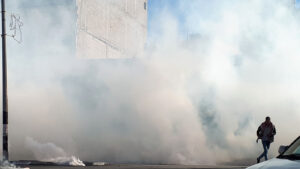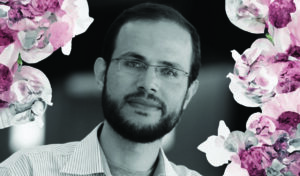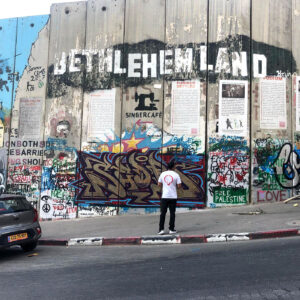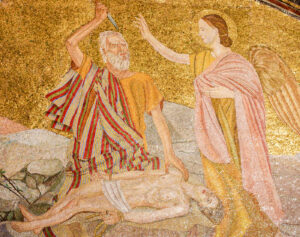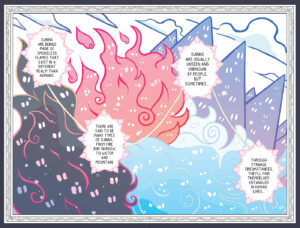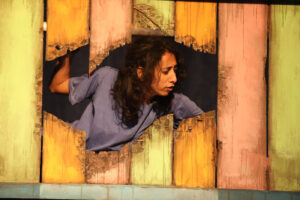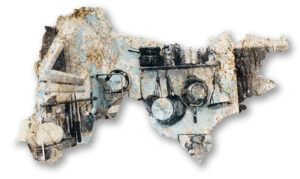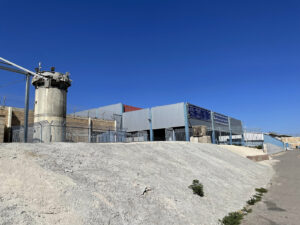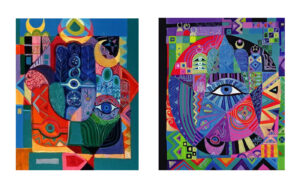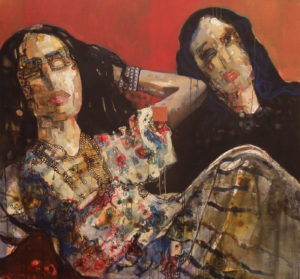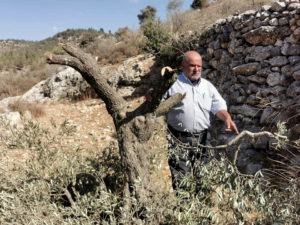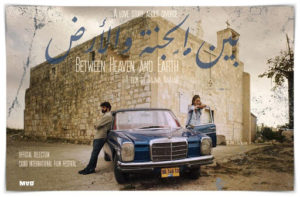With travel through the checkpoints almost impossible, people in the city of Tulkarm and the surrounding villages not only endure closures but constant military incursions, even airstrikes by the IDF. Too often these experiences are unremarked upon or worse yet ignored by the west. One writer’s mission to bear witness to the heavily weighted odds against the Palestinian people amplifies voices and experiences that are moving beyond belief.
The Road home: when 90 minutes becomes a two-day journey
I informed my mother that I was in Jericho. Then my mobile phone died and I couldn’t recharge it. I started asking people about safe ways to get to Tulkarm, and they directed me to a taxi driver, who had extensive experience of all the alternative routes — the side streets and mountain roads. I contacted him from one of the street vendors’ mobile phones, and he came to discuss the difficulties and the risks. We agreed to take the longer but relatively safer, way.
In the taxi were four passengers and the driver, all men in their thirties with pale faces and long beards. I was reluctant to travel with them until one of them said, “Get in, sister, whatever happens to you will happen to us, and we will not risk it. We will move carefully.” Two of them were workers in Jericho and the other was traveling from Jordan.
We left Jericho towards Highway 90 and the driver soon turned onto a dirt road. Halfway down, a hail of bullets came from an Israeli tower in the Jordan Valley. The driver thinking we were the target stopped immediately. He began to shake and pray to God for salvation. Ashen-faced he told us to lie down under the seats. We remained there for several minutes before realizing that the target was another car. We returned to our seats and the driver continued down small, narrow, dangerous roads. Every now and then, 300 hundred-meters away, Israeli cars passed normally on asphalted roads. As we traveled the unpaved mountain roads from one village to another, from one farm to another, I was completely unaware of where we were as though this was not the countryside though which I had driven my car a thousand times.
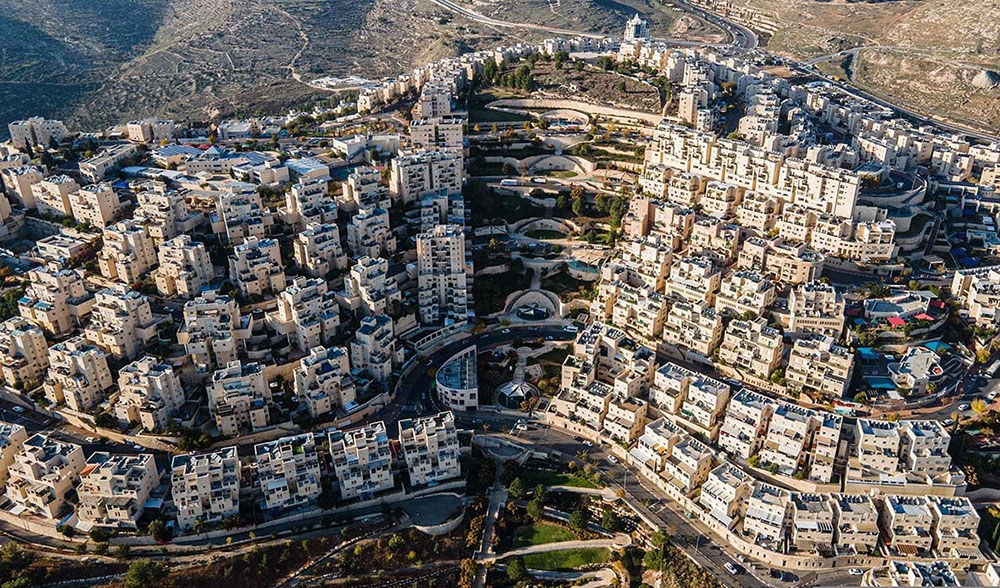
Zatara Military Checkpoint: a maze of control and separation
After about two hours we arrived at the Israeli military checkpoint of Zatara which cuts off the center of the West Bank from the north. It is one of the largest military checkpoints and serves as a link in an extensive network of Israeli settlements built on the land of 1967. It is here that one realizes the extent of the huge transport network that separates the Arab Palestinian villages from one another, but connects the main Israeli settlements with the huge roads that run between and through them.
They facilitate the movement of Israeli settlers while controlling the movement of Palestinians. These transport networks seem to be the main body of the conversation, while the Palestinian villages beneath them have become unimportant footnotes. They seem like ancient slums destined to be wiped out one day by another civilization.
We were still waiting at the Zatara military checkpoint, with other Palestinian cars slowly approaching the watchtower and checkpoint from all four directions. The soldiers searched car after car, checking IDs while pointing their guns at people. After waiting forty minutes, we made it to the checkpoint. The soldier looked at me in the front seat and asked where we were going, while another soldier looked around the car and scanned our faces, as though searching for an explanation as to why he stood in front of civilians, armed to the teeth. Perhaps the soldiers could find no reason to stop us, so they let us continue towards Nablus. We were allowed onto one of the recently built Israeli roads, avoiding the village of Hawara, until we reached another checkpoint near Nablus, in an area known as the Jetzhar settlement. This time the soldiers were selective; they stopped us without question and let the car through. We drove on for another 20 minutes.
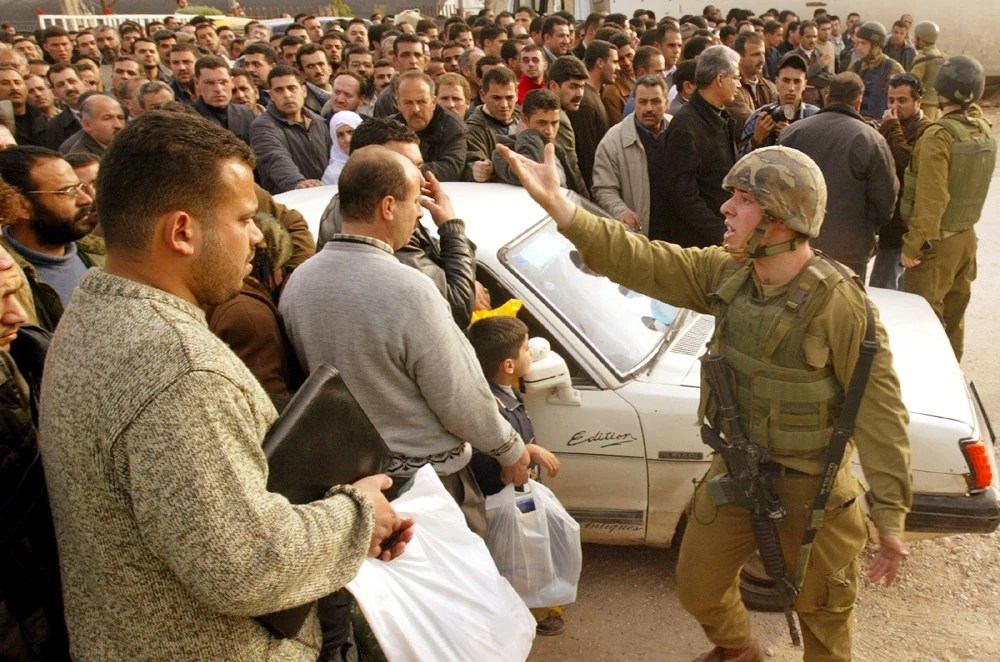
Stranded by soldiers, sheltered by strangers: fleeing Anab Military Checkpoint to Shufa village
We headed towards the village of Beit Lid near Tulkarm, on the way to the main Israeli military checkpoint of Anab. We were about 500 meters from the checkpoint when the soldiers started shooting, running, and shouting. The driver reversed back up the street, turned the car around, and drove back to Beit Lid. Later we learned that the soldiers were targeting three young men who were trying to leave the town. Accordingly, the checkpoint was announced closed until further notice. This is how events escalate in a matter of seconds where people suddenly find themselves in the middle of a military incident without warning.
We entered the town of Beit Lid and looked for another route; it was not logical to return all the way we had traveled since we were only a few minutes away from our homes. While we didn’t know anyone in the village, the people there were aware that many travellers might be stranded. A number of village men were sitting in a popular café and offered us coffee, water, and dates for free. They were very welcoming and, without hesitation, said we should stay with them in their homes. But the driver suggested that we head to the next village, Safarin, and then to Shufa village, through unpaved mountain roads devoid of the army.
In the village of Safarin, we stopped in front of a small grocery store, and the driver asked how to get to Shufa village. We then continued onto a street usually reserved for Israeli cars and drove for about a kilometer. It was a very wide street, and from the east we could see the sparkle of the Mediterranean Sea. All the roads signs indicated the direction of the beaches. However, somehow the beach is not meant for the Palestinians. The Israeli separation wall stands between us and the sea like a implacable, voracious monster.
Shortly after the driver turned onto a rough mountain road, which reminded me we were still struggling to reach Shufa village. The shaking of car hurt my stomach and my thoughts became disjointed. I felt nauseous and I told the driver that I would continue on foot. He momentarily stopped the car and looked at the other passengers. They all burst out laughing. Of course, we continued driving on, and around 5:30 p.m. we finally reached Shufa, the closest village to the city of Tulkarm. There we learned Shufa was closed militarily in the direction of Tulkarm and we could not leave. Our arrival, the villagers told us, was nothing short of a miracle.
I was very exhausted and could not continue with the journey. I called a family from the village I knew and asked them if it was possible for me to rest a little with them. This family contacted the driver and they arranged a safe place to meet. I said goodbye to my one-day traveling companions, and left. The family had prepared some tea and a small dinner of Palestinian bread, oil and za’atar. I changed my clothes and sat talking to them.
Shufa village is in a closed military area and its residents have not been able to enter or leave since October 7. The village was without lights since the availability of electricity is in the hands of the Israelis. From the west, the village is bordered by several settlements, the most important of which is Avnei Hefetz that surrounds the village. The settlement was lit and separated from the village by Israeli military training camps and an electric fence illuminated by huge searchlights. Between the village and the settlement, there are two unconnected worlds in conflict, each denying each other’s existence. Perhaps nothing unites the two. Yet they share the wrong time and place. It is difficult to understand that they share the same dream of the Holy Land.
While we were talking, the family’s little 13 years old daughter was attempting to charge my phone in vain. The girl was very thin. When I tried to joke with her she didn’t smile. Although she was curious about what I was carrying in a large travel bag, so I gave her one of the nutritional supplements that I had brought with me. The family kept talking about the poverty that afflicted the people of the village, which is rich in agricultural land, and about their despair, misery, and the lack of education. Since no one can enter or leave, Shufa had become a prison. We spoke until dawn and the muezzin’s sudden call to prayer — “God is great. God is great.” His voice resounded though the village like a bird waking people from their slumber. He knows they will not be able to pray in the mosque, but he tries anyway.
I finally surrendered to sleep and after two hours the driver called the family and asked if I wanted to go with them to the Anab checkpoint. We had no choice but to try again or wait there. After the driver picked me up, I learned that he and the passengers had also spent the night in the village where some families had received them. At the Anab checkpoint we waited in a line of cars. It moved but very slowly. By 7:50 a.m. we were inside the checkpoint. The five soldiers were no older than 25 years old. The one that approached us was Black, with sunken eyes and a face dissatisfied with life. He asked for our IDs and checked where each of us was going. One of the soldiers took all their gear and went inside the military platform, which on top had a sniper soldier, dozens of modern cameras monitoring the place, and a tower with was an automatic weapon that fired bullets on its own. The soldier returned after ten minutes and let us enter Tulkarm.
Destruction in the city
As we traveled from the town of Anabta to Tulkarm, everything seemed normal so I relaxed a little. Then on the outskirts of the city, three kilometers from my family’s home, the driver turned northwards, away from the main entrance to the city. It was then I realized that the destruction I was witnessing was unwritten, unwanted, and beyond anything I could have imagined.
The main road had been turned into very deep craters, filled with asphalt rubble, and bomb debris after military bulldozers had dug it up and rendered it unusable. I looked at the street in amazement. It was as though a meteorite had hit the place where many houses and shops had been destroyed. All signs of life had been removed — no trees, no cafes, no greengrocers, no bakery — everything was completely destroyed. My thoughts and feelings were confused. I was overwhelmed by a fear I had never felt before in my life. We drove along fragments of roads that were not safe. They weren’t even side streets, but dangerously unstable edges that loomed over the wadi Alzomar.
Someone had built a dilapidated wooden bridge for cars to get from one side to the other. We crossed the wadi. To our left was the partially destroyed cemetery of the Nour Shams camp, where the graves had been dug up. The cemetery was also filled with new graves. The driver seeing it then turned to me. “Half the young men of the town are buried here,” he said, “many of our sons have died.” I asked the driver to stop for a couple of minutes. I put my feet on the ground of Tulkarm and looked around. The entrance to the town was like the wreckage of a plane, its parts scattered.
My family home
I arrived at my parents’ house and went down into the garden, but no one was waiting for me except two little cats. No one came to greet me. The door of the house was half broken. When I moved it with my hand out came a rusty, chirping sound and there was my mother standing two steps away. I looked at her. Sadness had eaten away the features of her beautiful face. Her black, almond-shaped eyes, now bulging, were covered by a blue haze that prevented her from seeing clearly. When her eyelids drooped, I could see a shadow like a dark flush beneath her skin. Trauma was evident in her demeanor. Her black hair had turned white.
She took a step towards me, hugged me, and cried out, “They killed your cousin in front of everyone and we are not fine.” Her head shook involuntarily.
I took her by the hand and we sat and talked about everything that had happened while I was away. It was difficult for her to hear my calm voice. Then I realized she had problems hearing so I had to speak very loudly. As for my father, his face had become pale and swollen. His steps were heavy as he walked towards me. He couldn’t reach out his hands to embrace me. I looked at his head and saw a deep wound with three stitches. Two days previously he had lost his balance and fallen to the ground in the street. People in the neighborhood thought he was dead.
After less than an hour it started to rain. My father was happy because it was the first rain of the season. But the rain was heavy and water poured into my father’s bedroom and the living room. I brought some large plates and placed them under the corners and put blankets on the floor to catch the water. And I began to sweep the water out of the house with a squeegee until the rain stopped.
Exhausted, tired and in pain, I didn’t know how to begin and what action to take, which might relieve some of the burden on my family. My mother brought me a cup of Arabic coffee and I sat down with her and asked what had happened to the house.
My father had inherited it. More than 300 years old, it is built from huge stone and five meters high, with an arched dome that is connected to an old wall that separates our house from the neighbor’s. This is the first part, the second we’d constructed little by little over the past 20 years. The house is on a hill and faces the western side of the Tulkarm refugee camp. Due to the intensity of the rockets and explosions in the camp, our house cracked and portions of the roof fell in.
My mother explained to me that every time there was an invasion of the camp the house shook with everyone in it, and this had undermined the older foundations of the house. How many times had she and my father felt imminent destruction on the other side of the door from the soldiers’ guns? She talked and talked and while I listened, the voice of life died in her throat and death seemed like crumbs that she swallowed in pieces. I knew that my family was suffering like any other Palestinian family. Still, I didn’t realize that the situation was as miserable as this: that the house was falling down and their financial situation was poor. The mind is paralyzed. Ideas disappear, and words are lost; life becomes an illusion, an illusion that is never understood.
A brief respite
After four continuous days of military raids and imposed curfews, Tuesday came and it seemed like a quiet day, but how can there be a quiet day during war?
I woke up in the morning, checked the local news and WhatsApp group where members would share news from the neighborhood. I found out that there was no army in our garden and no sniper on top of the neighbors’ house. With quick, cautious steps I walked to the window and peeked out from behind the curtain to make sure. Indeed outside seemed free of soldiers.
I opened the balcony door, which had become a little stiff from lack of use. I took a step forward and saw the sun shining after days of rain. Some pine trees planted before I was born still swayed in the gentle light breeze, as if flirting with me for a day free from the scrutiny of military restrictions. It seemed like a perfect day for a swim. But even so, every minute here has a price, needs a plan, and someone somewhere is waiting for me to help them survive.
My mother, still weak, anxious, a little ill, has difficulty walking. The best cure is to keep her busy outside the home, so I decided to take her to work. This way, I can spend time with her and help others at the same time. Thinking that such activities might give hope to my mother’s soul, and that her appetite for food and life might return, I contacted my colleagues. Twenty-one coordinators involved in a local community initiative agreed to meet in the office. Today we were going to have our first face-to-face meeting after 14 months. I got into my car thinking that I could reach the office, but to no avail, since most of the roads seemed to lead to dead ends.
As soon as I drove 200 meters from home, I realized that it was impossible to drive; the usual roads had disappeared and become deep corridors. Trees that we had planted over the years had been uprooted and laid like dead bodies on roadsides. The dust was thick like fog in the air and the streets were factories producing pollution. The smell of gunpowder and weapons crept into my lungs like an insidious killer, from which not even a medical mask could provide protection. Soon dust covered the inside and outside, a layer of ash over the mind. I am torn between truth and the denial in a place where I have spent my life helping to build and support its communities through various projects.
However, my mother and I tricked our memories and in the car started trying to cross from side streets or from people’s private gardens and yards. Then people directed us to an external agricultural road, and from there we were able to reach the area closest to the office. We left the car and continued on foot. My mother walked with slow, heavy steps, trembling at every uncertain movement or sound around us. The market in the city center was open today and people who had money were rushing to buy the bare essentials. Those who had none were looking for any source of support to save them during the coming military invasion.
I started the meeting with those of the coordinating colleagues who were able to reach the office. We discussed the urgent needs, the priorities and the plan for the week. The team then decided that this week we would focus our support on widows and orphaned children. We collected winter blankets, milk, water, and bread.
The team is already working in their locations. Each person will reach out to families in their neighborhoods with the goal of contacting around 200 families. I left the office with my mother and two other colleagues and we went to meet colleagues from the Palestinian Red Crescent Society. Then we all went to the community house where 40 orphans were staying.
We entered the room of the orphans, the oldest of them 13 years old and the youngest just born this morning. Without exaggeration, their faces were old and their features were nothing but reflections of a slow death — truly resembling death. There is no life in them. They simply cling to each other and scan our faces for a dose of life. As soon as I noticed the presence of the orphan born this morning, I lost any inner peace I had. We handed out a few things to each of the children, talked to them a little, and then left them with the two women who care for them.
Return of the Israeli Army
I walked around the market with my mother to buy more things. Here, I know the café owner, the roaster, the shopkeeper, the taxi driver, and the bread seller by heart. Yet, I would have walked past them and not recognized their faces marked by misery and grief, now desperate and yellow like worn-out, tattered clothes. The whole place reminded me of an ancient painting. People smiled quickly when they saw my face and spoke words of welcome and optimism that someone had returned. I talked to them one by one, bought things from them one by one, and we had brief discussions about the market situation and poverty, which seemed like a fire that was eating everything and would soon devour even those who could still afford to survive.
Now, it’s 4 p.m., I’m buying bread, and suddenly people started running and moving suspiciously. There’s heavy gunfire in the air. Without warning the Israeli army has returned. Some military jeeps and bulldozers enter the market area, the soldiers start firing sound and teargas bombs, shooting in the air and calling again for a curfew. People panic, shopkeepers start closing their shops. I hold my mother’s hand to get back to the car, but her body is shaking badly and she says, “I can’t walk.”
I give her some water, looked deeply into her eyes and say in a sharp voice, “Please stop shaking now. I am with you.” But I understand her fear.
The car is eight minutes walk away, luckily on the opposite side of the soldiers, but every second here could be our last. We slip through the back door of the bakery, through the small shopping center and finally leave the market and reach the car. No, no, I am not coherent. My heart is literally beating in my throat and making it hard to breathe. My feet can barely tell the difference between the accelerator and the brakes, but I am trying to hold myself together. I want to get my mum home safely.
Airstrikes
We were back at home before the sun went down. I opened the car door, got out and looked at my mum, joking with her a little and telling her we could have died together. Our exhausted faces smiled, although for Palestinians it was more like a grimace, which said, “but we made it!” She went to bed to rest. Meanwhile, I sat under the almond tree in my father’s garden, because I really needed to breathe and settle down, so that my mother couldn’t tell how nervous I was. My niece Sundus, six years old, came out of the house of my brother who lives in the lower floors of my parents’ house. She walked through the garden and up the stairs to my mother and father’s house. She was carrying a plate of food that her mother prepared.
“Do you want some?” she said.
“No.” I replied.
She then said, “My grandmother went to work with you today, I think it is my turn tomorrow.”
I laughed.
She said, “Why are you laughing? I have a beautifully colored dress and I haven’t worn it yet.”
I promised her to go out with me on a day that I would decide, not her. I continued, “Come here, what will I get in return?”
Her eyes began to shift left and right as she thought, and with a wry smile she said, “I’ll give you a can of tuna so you can eat it when the soldiers impose curfew.”
Well, how could I possibly refuse such an offer?
As soon as she turned to go up the stairs, the ground beneath us moved as if it was going up and down. I felt I had been thrown out of my place, as if an earthquake had shook everything. I looked at Sundus, completely frozen, unable to take another step, crying deeply and silently. Her breathing was choked in her throat from the intensity of her crying combined with fear. The plate fell from her hand and broke. I ran towards her and found her body stiff and immobilized. She was not breathing, so I started hitting her fingers and her small cheeks to stimulating her and prevent her from losing consciousness. Meanwhile I heard the sounds of ambulances. My brother came running with a bottle of traditional perfume to wake up his daughter.
I realized that this was not the first time Sundus’ body had frozen like this. Every time there was a nearby explosion, she would fall to the ground and suffocate. Her little head was thrown on my hand like a loose piece of cloth as I tried to get her to smell a little perfume. Then I said, “Didn’t we agree that you would go out with me tomorrow?”
She looked up at me with her innocent, fearful eyes and finally started to breathe. “That was very scary,” she said.
I hugged her tightly and carried her into the house. She then stared at me and said, “Am I really going out with you tomorrow?!”
Hmmm, I am in trouble now in front of her little eyes, she was getting really bored of staying at home day after day. I know very well that a military invasion has begun and that all we can do is wait and see what the weapons industry is trying to do tonight, tomorrow or the day after.
I left her with her mother and went to watch the news and found out that there had been an air strike a few hundred meters from our house, killing and wounding dozens of people. This bombing was exactly where the car had been a few minutes earlier. It was very possible that I was there and it was very possible that I was not here and that I am not the one writing this story.
Here we live and die and live and die over and over again, to the point where one of us wakes up in the morning thinking that he/she/they are dead and did not survive last night. To realize that, you are still in a circle of uninvited conflict in which you are completely voiceless!
Sally No Longer Waves “Hello” or “Goodbye”
It is Tuesday 11:00 a.m. — time for the Israeli military troops to change shifts in Tulkarm. This is the right time for us to act and work with some children who need mental and psychological support. Together with a colleague, I was able to meet 14 children between the ages of seven and 14. I sat with them in circle and started the session by introducing myself and asking the children to share their names, where they live, their hobbies and future dreams. Essentially these are simple questions for a child and the building blocks for some sense of personal identity at their young age. Despite this, it was very clear from the children’s answers that their sense of self was confused and unclear.
For example, one girl, who introduced herself said, “My brother is a martyr and my life ended after him.”
A boy introduced himself, “I am Rami, our house was destroyed, I am displaced and now we sleep in a school.”
Another boy said simply, “I am Saeed and I do not have dreams because Palestinian children don’t grow up.”
These harrowing experiences have essentially become the foundation for how these children viewed themselves, as bystanders of suffering and what’s left of their families. There is no room for them to carve their own sense of self with the fear that their place on earth will be taken as quickly as the others.
Pale eyes, drawn with a sadness, depression and anxiety — their young faces were burdened with tiredness, helplessness and despair. They are crying out for life, and hopelessly waiting for any response. Here I am, looking deep into their eyes, without being really able to provide any real relief but I decided I will try anyway.
I began with the first exercise: I asked the group to draw something that expressed the most difficult moment they have been through. Seven-year-old Sally drew a civilian man, naked, with his hands raised in surrender, surrounded by a group of soldiers and military vehicles with the Israeli flag on top.
Sally shared the story behind the picture: “A few weeks ago, after midnight Israeli soldiers came to our house and started dropping sound bombs in the garden. I was very scared when my mother said they were here, and we had to leave our home. Then my father opened the door and my mother put on my shoes and jacket, and I held an apple in my hand. After a while the soldiers started yelling at us, telling us to leave. My mother wouldn’t let me go into my bedroom to get my toys, and I was very sad.” Sally tried to hide her tears as her voice trembled.
She then gathered her strength and carried on: “They took us into the garden, and then they asked my father to go down to the street, and lots of soldiers pointed their guns at him. A soldier with a loudspeaker shouted, ‘Take off your trousers,’ and my father took off his trousers. The same soldier said again, ‘Take off your shirt’ and so on until my father was almost naked except for his underwear. I thought I was dreaming, why would my father remove his clothes in the street after midnight while we were watching him.
“Then my father raised both his hands and started moving towards the military jeeps while soldiers shouting and saying things I didn’t understand. My brother and I thought he was waving to us and saying goodbye. We waved back and said: ‘Goodbye Dad, but he didn’t say anything; he didn’t even look at us. The soldiers pushed my father into a military jeep and drove away. We don’t know where they went.”
I look at the seven-year-old girl and her trembling blue lips as she speaks. Her eyes are filled with disappointment and obvious signs of shock. Yet, she continues to tell her story, as if searching for her father in our eyes, in our cameras, in our presence.
She continues, “We went home alone with my mother. I asked her why he didn’t wave back to us? She shocked me with the answer when she told me, ‘Your father raised his hands to surrender to the orders of the soldiers who took him to the military vehicle. He wasn’t waving to you. He was surrendering and if he didn’t follow their orders, they would have shot him.’” Sally cried.
“When I realized he wasn’t waving to us,” the little girl continued, “I felt very sad, especially since my father hasn’t come back home to this day. I hate myself for thinking he waved to us and I don’t like to wave or say hello or goodbye to anyone anymore.”
Sitting in the middle of these little children and their stories, one right after the other, I struggled to remain calm, despite trying to cope. I moved on to the next exercise and asked them if they could remember the happiest moment in their lives. Most of them expressed difficulty in recalling the good memories, saying that they get headaches and itchy eyes whenever they try to remember.
Despite everything, despite the impossible details of their daily struggle to survive, despite their dull and tired eyes, they still have faith in humanity. They are waiting for the good people of the world to help and put an end to this.
* Thoth is a pseudonym used by the writer to insure their personal safety.



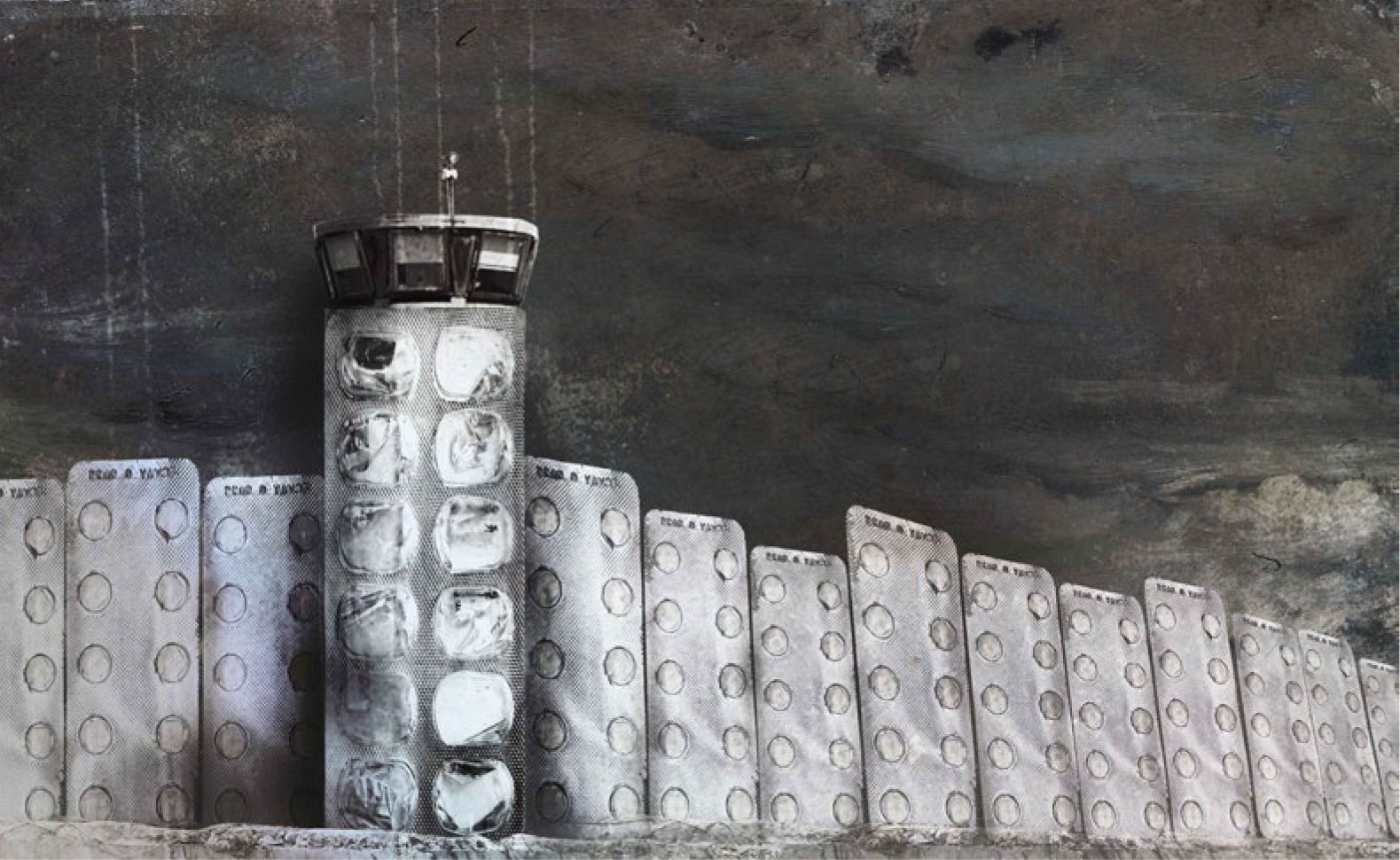

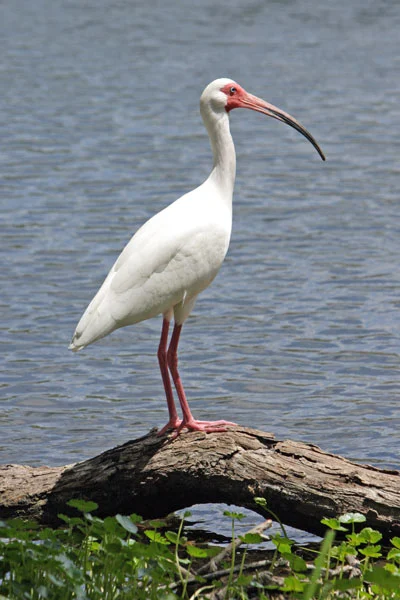




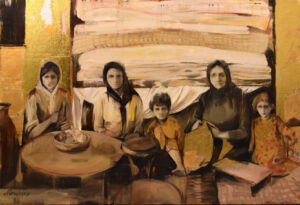

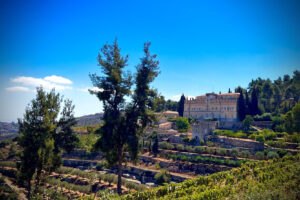


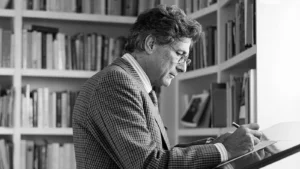














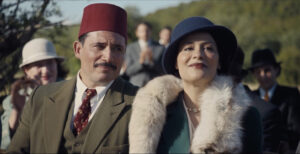


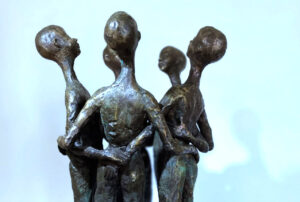































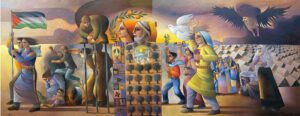


























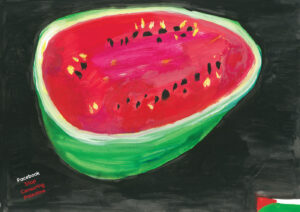




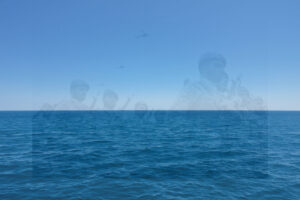














![Fady Joudah’s <em>[…]</em> Dares Us to Listen to Palestinian Words—and Silences](https://themarkaz.org/wp-content/uploads/2024/03/SAMAH-SHIHADI-DAIR-AL-QASSI-charcoal-on-paper-100x60-cm-2023-courtesy-Tabari-Artspace-300x180.jpg)












